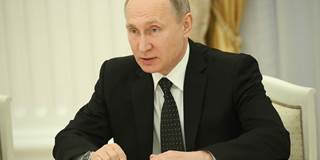Vladimir Putin and other post-communist autocrats sell their system of “illiberal democracy” on the basis of pragmatism, not some universal theory of history. But while they have certainly been effective in stirring nationalist sentiment and stifling dissent, they have been less successful at nurturing long-term economic growth.
NEW YORK – Today, a quarter-century after the Cold War’s end, the West and Russia are again at odds. This time, though, at least on one side, the dispute is more transparently about geopolitical power, not ideology. The West has supported in a variety of ways democratic movements in the post-Soviet region, hardly hiding its enthusiasm for the various “color” revolutions that have replaced long-standing dictators with more responsive leaders – though not all have turned out to be the committed democrats they pretended to be.

NEW YORK – Today, a quarter-century after the Cold War’s end, the West and Russia are again at odds. This time, though, at least on one side, the dispute is more transparently about geopolitical power, not ideology. The West has supported in a variety of ways democratic movements in the post-Soviet region, hardly hiding its enthusiasm for the various “color” revolutions that have replaced long-standing dictators with more responsive leaders – though not all have turned out to be the committed democrats they pretended to be.